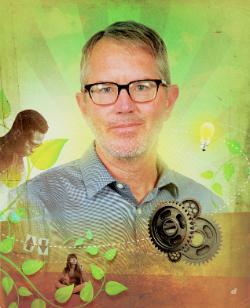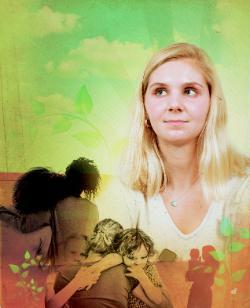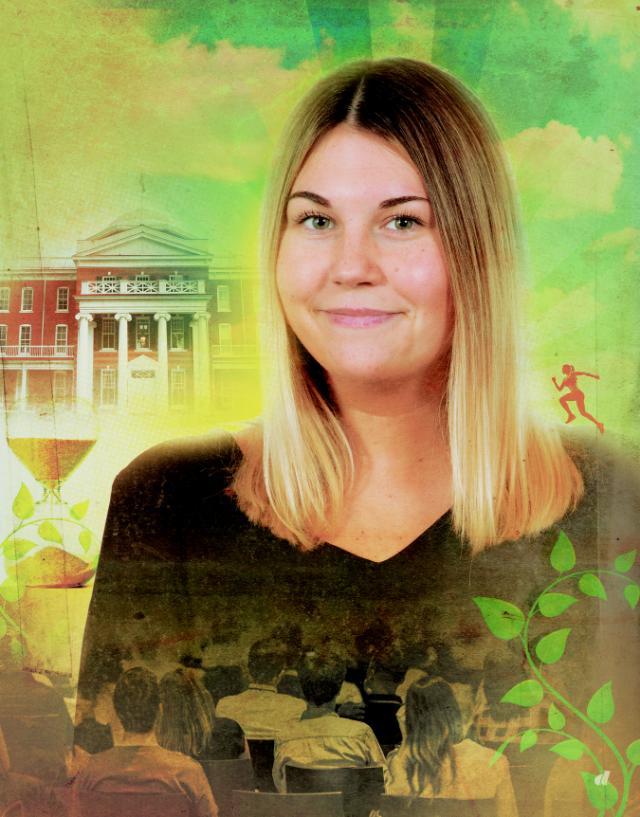
This spring, the first class of Longwood students to have completed the Civitae Core Curriculum, unveiled in 2018, will graduate. It’s an experiment, unique in American higher education, with “democracy as its North Star,” as President W. Taylor Reveley IV often puts it. This story—the first in a three-part series that explores how Civitae is shaping and inspiring students throughout their time on campus—looks at the impact of one of Civitae’s first components.
At a time when many institutions have lost focus on their role in preparing students for life and work in a democracy, the Civitae Core Curriculum has rekindled Longwood’s mission of citizen leadership.
Civitae is the heart of what makes Longwood’s classroom experience different and special, right from freshman year: big cross-disciplinary questions, small classes, top faculty, and moments of connection and inspiration that can shape students’ entire college experience and beyond. Paris Dailey ’25 says the moment that changed her whole freshman year came when her phone started pinging with text messages.
They were from her classmates in Citizen 110: Social Entrepreneurship who were working with her on a group project, and something amazing had just happened. The information they had spent weeks gathering, calling nonprofit after nonprofit to compile a list of resources for area women suffering from domestic abuse, was getting shared beyond Longwood.
“I thought, oh gosh, this is something new,” said Dailey, a freshman health and physical education major and a member of the Cormier Honors College from Richmond. “We’re actually doing something that has the potential to affect people’s lives.”Moments like these are the hallmark of a group of courses under the umbrella of Citizen 110. All freshman Lancers now take one of these courses, which mark the foundation of a four-year journey through Civitae. Built around big questions of citizenship and foundational skills that prepare students for successful careers, these courses aren’t your typical freshman-level classes. They’re distinctive and designed both to start students thinking about their place in the world as well as to develop and flex skills they’ll need to navigate to that place.
Citizen 110 classes frequently produce moments that shape the rest of a student’s college education. It could be, as in Dailey’s case, building a real business that addresses an issue a student is passionate about. Or it could be the fourth public-speaking presentation, where a student realizes they’re now comfortable advocating for a viewpoint in front of 25 sets of eyes. Or it could be a professor’s question about a play by Sophocles that makes them reconsider how they thought about literature and life.
Honors Faculty Scholar Jacob Dolence, who teaches Social Entrepreneurship, tasked Dailey and her classmates with choosing an issue of particular importance to them and building a business around that issue—not just a hypothetical exercise, but a real organization that worked in the world.
For Dailey and her classmates, that issue was abuse. The business became an information network dedicated to connecting victims of domestic abuse in rural areas with resources in their communities, where resources often are scarce. “That’s been the most surprising thing,” she said. “We started trying to find information about these resources, and it was difficult to understand how little is available to women. So it all started to become bigger than I thought it was.”
Four years after the launch of Civitae and 3,100 students later, Citizen 110 courses have become a Longwood freshman’s welcome-to-college moment—that time or event where they realize there’s a broader way of thinking about not only the subjects of their classes but also issues they will confront through-out their lives.
Most general education programs are not coherent. There’s a sort of check-the-box mentality that Civitae does a good job of countering ...
Dr. Derek Taylor Tweet This
Building Perspective

In the mid-2010s, when a new general education program was taking shape among the Longwood faculty, the development of citizen leaders remained at the core of the deliberations. Among a host of innovative ideas developed was one rooted in what it means to have a full college experience. The product of that idea, Civitae is infused throughout all four years of a student’s time at Longwood, starting with their first semester.“
Most general education programs are not coherent,” said Dr. Derek Taylor, a bespectacled British literature professor and Citizen 110 coordinator. “There’s a sort of check-the-box mentality that Civitae does a good job of countering because it keeps reiterating key points throughout the curriculum all the way up. And those key points are the basis of what students learn the minute they walk through the doors of their Citizen 110 course.”
What defines Citizen 110 and sets it apart from the giant, typical introductory courses that students encounter at most institutions? One key thing is the faculty. Many are Longwood’s finest, full-time professors, often tenured, and they’re teaching freshmen in cross-disciplinary courses that get everyone talking about issues from a broad range of disciplines and perspectives.
Dolence teaches his Citizen 110 course from the perspective of social entrepreneurship. Across campus, Dr. Mark Lukas approaches it from his philosophy background. Dr. Chris Kukk, a political science professor and dean of the Cormier Honors College, draws on his research into compassion. Citizen 110 also is taught as a business course, a journalism course, an English course and a kinesiology course.
That multidisciplinary approach is what makes it work, said Taylor.“
I use this analogy to explain it. All sections of Citizen 110 are in orbit around the same point of gravity. While these classes are not in the exact same orbit, we are all cognizant of what each course is supposed to be teaching, which is a focus on the relationship between individual rights and a responsibility to the common good, critical thinking skills, ethical reasoning and public speaking. So while I might come at those topics through a discussion of a play by Chekov, other faculty rely on their particular expertise and disciplinary approach to build their own unique sections of the class.”
Each of those four key concepts is practical—valuable both as students consider their place in the world and as they prepare for the workplace. In survey after survey, employers list critical thinking and problem-solving skills among the most highly sought-after skill sets they look for in potential employees. And, as Taylor explained, the ability to speak clearly and confidently is valuable in almost every profession.
For faculty who teach the courses, it’s an opportunity to expand the scope of their discipline and show freshman students how different disciplines can be applied to similar questions of citizenship and democracy.
“When I first designed the course, I found that social entrepreneurship teaches skills that line up really perfectly with the goals of [Citizen 110],” said Dolence, the professor who is guiding Paris Dailey and her classmates through their Citizen 110 course. “This is your toolbox of life skills—both hard and soft skills that you can pull out at any time in your life when you have to solve a problem.”
Faculty can’t wait to teach one of the courses—a rarity for freshman-level offerings at universities across the country. But it’s exciting to see students grow and build the skills of citizenship.“One thing that changes for students is they come to the class and already have strong views about even the controversial issues,” said Dr. Adam Blincoe, a philosophy professor who works with the Cormier Honors College and has taught his Citizen 110 course—Choosing Well, Acting Right, Being Good—for several years. “Often students’ views don’t necessarily change. What changes is that they develop better reasons for their views and can express them more clearly. So, at the end of the class, they can persist in disagreement with someone else while continuing to have a relationship with that person, which is an essential element of democracy.”
What is Citizen 110? A primer
Longwood’s Civitae Core Curriculum, the pathway that all students must traverse in order to graduate, is built differently from most general education programs. Most distinctly, students take Civitae courses throughout all four years at the university, each class building on skills and information learned in previous courses. This strategy helps students bring a variety of perspectives and skills to bear when confronted with complex issues related to not only their careers, but also their communities.
The first step in Civitae is a pair of freshman-level courses that all incoming students take: English 165 and Citizen 110. While English 165 is a signature writing-intensive course designed for students to learn college-level writing skills, Citizen 110 sets the stage for a different way of thinking.
Taught by professors in different disciplines across campus, Citizen 110 courses focus on introducing and building four skills students will take with them through their time at Longwood and beyond:
- The relationship between individual rights and responsibility to the common good
- Critical thinking
- Ethical reasoning
- Public speaking
“What we’re getting at—what we’re teaching—is the heart of a democratic society,” said Dr. Derek Taylor, professor of English and coordinator of the Citizen 110 courses. “These are questions that people ask themselves each day as they make decisions about what is important. Understanding not only how to ask those questions but also how to bring a lot of different perspectives to bear on answering those questions is paramount to becoming a citizen leader.”
Freshmen are placed in a Citizen 110 course in either their first or second semester of their initial year on campus. They take an English 165 course during the other semester of their first year.
Often students’ views don’t necessarily change. What changes is that they develop better reasons for their views.
Dr. Adam Blincoe Tweet This

Now in their fourth year, Longwood’s Citizen 110 courses are doing more than producing memorable moments. They are prompting students to newly imagine possibilities for the rest of college—and beyond.
For Paris Dailey, the experience of working with energized classmates and experiencing the thrill of real-world impact broadened her horizons.“
I’m a very by-the-book type of person,” said Dailey. “The plan was to go to college, take normal classes and get a normal type of job. But this has really broadened that—I don’t know what’s going to happen with it, which is sort of scary but also really exciting. It’s helping me to see the world in a different way.”
Taylor said the Citizen 110 classes “are doing three things at once. The first is giving students the requisite skills they need to succeed in college. Then, how do we pique their intellectual curiosity? And we start to introduce them to these key concepts like questions of citizenship that we can then reinforce all the way up to the symposium level. And it’s really working.”
Just ask Peyton Chase ’21, an upper-classman who has some perspective on how the class shaped the rest of her education. Chase, a psychology major, was put in a Citizen 110 class four years ago in a completely different discipline: Civic Engagement Through Sport and Exercise, taught by Dr. Tim Coffey, assistant professor of exercise science.
Like Paris Dailey, Chase’s welcome-to-college moment came early in her Citizen 110 course: standing in front of the class, just a few short months removed from high school, her hands shaking with nervousness, Coffey watching from the side of the room.
Notecards? Nope—Coffey doesn’t allow them during speaking presentations.
Reading what’s on the PowerPoint slides behind her? Not a chance—slides aren’t allowed to have words.
“Everything was on a different level in that class,” said Chase. “Dr. Coffey took us out of our comfort zone immediately and put us in a position where we had to present to the class confidently and with authority. And the crazy thing is, I started to feel confident the more and more we made presentations. I’ve never forgotten that moment as I’ve gone through four years here at Longwood, and it’s helped me time and time again.
”Like Dailey, Chase’s final project explored a pervasive issue across the country—addiction. As she built a program called “Addicts for Exercise,” she was confronted with those four basic concepts: how are we responsible to the common good for all people, what is ethical, deep critical thought about an ongoing issue and confident public-speaking skills when pitching the idea. Four years later, she’s exploring those same ideas as a senior in her final Civitae class, just at a much more elevated level.“
Civitae courses—especially that first Citizen 110 course—really have been my favorite courses,” she said. “Even though I’m studying psychology, they were the courses that made me think more about what I am passionate about, and what I want to accomplish outside of a career with my life.

